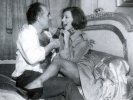Eye For Film >> Movies >> Les Noces Rouges (1973) Film Review
“ORESTES: Goddess, tell me if I am innocent or guilty. I will accept your verdict. MINERVA: This cause is difficult. What mortal would dare pass judgement?”
Presumably this quotation from Aeschylus’ The Eumenides with which Claude Chabrol opens Les Noces Rouges, is meant to indicate sympathy for his doomed characters and prepare the audience for a tale of such ethical complexity that we are expected to argue about it long after the curtain has come down.

The plot – based upon an actual murder scandal, which led to the film being banned in France – concerns Pierre Maury, a leftist politician who embarks on a reckless and passionate affair with Lucienne, the wife of the town’s conservative Mayor – a slippery political operator attempting to exploit a quasi-legal land deal to line his own pockets. Frustrated by their sexless/loveless marriages, the two lovers decide to take matters into their own hands with predictably dire consequences.
The narrative, in the broad tradition of James M. Cain, presents us with two people made so miserable by the cosmic injustice of their circumstances that cold-blooded, premeditated murder seems to them not only a means of escape but also a morally justifiable one. This isn’t necessarily problematic in itself. One of the defining characteristics of film noir is its use of narratives and characters that challenge the commonly accepted parameters of what constitutes moral behaviour.
The problem with Les Noces Rouges is that, having announced his claim to unanswerable moral ambivalence up front, Chabrol then appears to take our understanding of his protagonists’ torment for granted to such a degree that he barely bothers to dramatise it. Instead of bringing their desperation to life, the narrative unfolds in such a cold and detached manner, and with such austere dialogue and characterisation, that it becomes difficult to identify either with the passionate release that the lovers enjoy together or the misery they endure when forced apart. They are dispassionately observed pawns pushed perfunctorily into position in order to move the narrative towards its inevitable conclusion. I would hazard a guess that Chabrol chose this approach partly out of respect for the available facts on which the film was based, but also because he wanted the actions to speak for themselves. The result, however, is that by failing to get properly inside any of his characters’ heads, he sacrifices the empathy necessary to achieve the moral complexity suggested by the opening quotation. Instead, the characters’ amorality is transparently self-serving and short-sighted, and use of Aeschylus’ words seems desperate, inappropriate and faintly pretentious.
Yet in spite of this, there is nevertheless something curiously effective about the way Chabrol handles the denouement. Although clearly influenced by Hitchcock, much of the first two-thirds of the film more closely resembles the good bits of early dePalma. But while dePalma’s films tend to get more excessive and shrill as they go on, Chabrol finishes with a downbeat conclusion, the dry matter-of-factness of which carries a greater punch than any of what has preceded it.
There is even the suggestion of a kind of tragic redemption in the lovers’ dazed acceptance of what awaits them, as they appear to awaken from a dream or trance to be confronted with the consequences of what they have done. This combined with a strange and rather beautiful Herrman-esque score, a bravura scene in which the Mayor confronts Pierre with his knowledge of the affair, and the occasional stylistic pirouette mean that the film is ultimately not a tedious or irritating experience - just a hollow, frustrating and rather uninvolving one.
Reviewed on: 13 Apr 2006




















